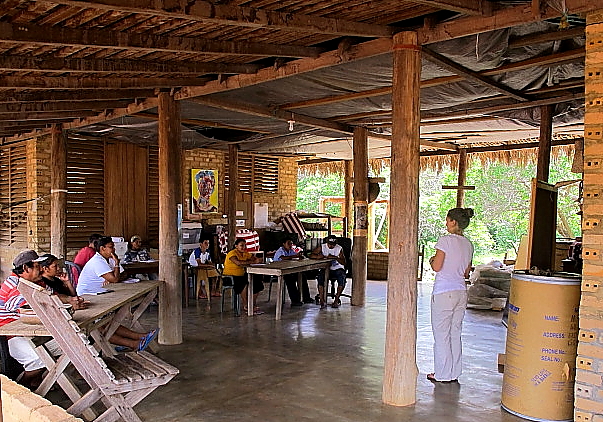Before Robin left us to go back home to the States, she visited Rewa Lodge. Rewa is a community run Eco-Lodge. She told us that they were expecting 15 people for 7 days!!! She said she was really worried about her new friends, this was a huge opportunity for this community run Eco-Lodge, but they had little experience hosting such a large group. The group coming are professional "Catch and Release" fishermen.
Karanambu is a member of THAG
(Tourism and Hospitality Association of Guyana), http://www.exploreguyana.org/
and a member of the NRDDB
(North Rupununi District Development Board) http://www.entrepreneurstoolkit.org/index.php?title=NRDDB_Community_Tourism_in_Guyana
So, in our capacity as members of both, we offered to go and visit and see what we could do to help. We took our head cook, Ms. Yonette Roberts, with us.
Our boats took us by river the first 1-1/2 hours to Genip Landing where we were picked up in a vehicle and drove us another hour to Kwattaman Landing where the Rewa boats met us and carried us for the next 2-1/2 hours to Rewa Lodge
Rewa Lodge is located where the Rewa River
meets the Rupununi River.
Our mission was to provide them with as much support as we possibly could in 3 DAYS!!
Our first job was to get things organized so that the staff could
function easily. Looking around the kitchen, we discovered that the stove
was in the back corner where there was
no light and no window. So we moved it to the other side of the room.
ROVIN adding an electric outlet for the freezer
|
Secondly, the freezer was in the middle of
the wall, so we requested a new outlet and we moved the freezer out of the
way. Previously, nothing had been kept in sealed containers. Now
everything has its own container which will prevent cross contamination.
The supplies were due to arrive in a matter of hours. In
anticipation of their arriving, our next step was to request substantial new
shelving in the storeroom. 1,2, 3 it was done!
The supplies arrived on time.
Then we began to organize the storeroom.
To someone who doesn't know the meaning of
"whiskey on the ROCKS"
this shelf is very daunting and bewildering.
Then we asked for new
shelving in the kitchen and began to organize everything from pots and pans to
the spices. Everything needed to be within reach and easy to find.
First thing each morning we had a
meeting to discuss what we needed to achieve that day and why!
The thought process is not an easy one to learn.
"How to see Rewa Lodge through the eyes of a guest"
* Anticipate their needs
* Which cabin is best for which guest and why
* Planning healthy menus and appropriate quantities
* The importance of protein and hydration for guests
* Dividing the responsibilities of all that goes into making a guest happy
* Preparing the coolers for the boats, the importance of ALWAYS taking water along in EVERY boat
* Preparing cabins - each morning and each night
* Providing drinks and snacks during the day & why
* Welcoming the guests back after an activity
* Preparing meals - timing and quantities
* Serving and Entertaining
* How to talk to guests
* How to prepare the kitchen for the following day
The staff was eager to learn. Yonette worked with each person individually. Sometimes in Makushi and sometimes in English.
She would ask questions and invite their comments, ideas and suggestions.
Yonette would show them something new, and then each person had an opportunity to try it.
Together
we discussed what changes would be best for Rewa Lodge. We decided
that a buffet table would be easier for both the guests and the
staff when there was a large group visiting. We also requested an
additional dining table to seat everyone comfortably.
We practiced using the buffet table
(purpleheart wood)
We
also decided that several lounge areas would be good before meals, for
drinks and snacks. A place for guests to have a drink and talk with
each other and their guides.
We
also made suggestions on how to prepare the guesthouses; how to make it
easier for each guest to hang their clothes and prepare for their
activities. When and how to put down the mosquito nets, change the
linens and respond to the needs of the guests.
And then, just as quickly as we arrived,
it was time for us to leave.
|


























































